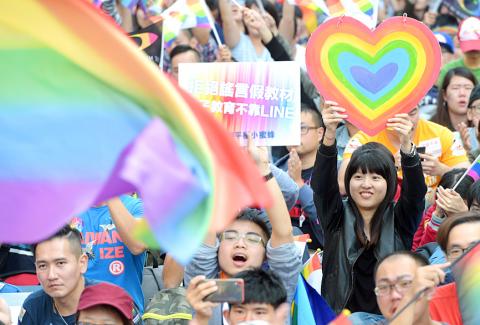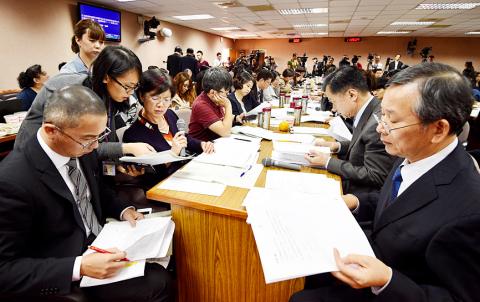Amid heated protests, amendments to the Civil Code to recognize same-sex marriage cleared a legislative committee yesterday, bringing the nation one step closer to legalizing same-sex marriage.
The legislature’s Judiciary and Organic Laws and Statutes Committee passed draft amendments to the Civil Code which would legalize same-sex marriage and entitle same-sex couples to the same marital, parental and adoptive rights and obligations accorded to heterosexual couples by the Civil Code and other laws, with the exception of the presumption of paternity, a legal determination that is still exclusively for heterosexual couples.
During the review, the committee revised an amendment proposed by Democratic Progressive Party (DPP) Legislator Yu Mei-nu (尤美女) that would neutralize the gender-based Article 972 of the Civil Code, which stipulates that a marriage is an agreement between a man and a woman.

Photo: Chang Chia-ming, Taipei Times
Yu’s amendment would remove the “man and woman” provision from the article and recognize marriage as an agreement between “two parties,” a contentious point between supporters and opponents of the marriage equality legislation.
However, to reduce opposition to the legislation, DPP Legislator Julian Kuo (郭正亮) raised a motion to revise Yu’s amendment, proposing that “man and woman” be retained, but inserting an addendum to recognize “both parties of a same-sex marriage.”
Chinese Nationalist Party (KMT) Legislator Hsu Shu-hua (許淑華) raised a similar motion.

Photo: Peter Lo, Taipei Times
Kuo’s motion was passed.
An amendment to the adoption regulations of the Civil Code would introduce an anti-discrimination provision to prohibit the courts from rejecting adoption applications based on gender, gender identification or sexual orientation.
The amendments, as well as other draft bills on marriage equality, are to be deliberated in cross-caucus negotiations before further reviews. The next legislative review is not expected until April.
“It is an act of democracy that the amendments were passed after communication and deliberations,” Yu said.
She called on the public not to spread misinformation about the amendments, as, unlike opponents of the legislation have said, the amendments would not remove the legal terms “father” and “mother” or “husband” and “wife.”
“The public can rest assured that the legislation will not change heterosexual marriage in any way, but it will extend [the rights and obligations of] such marriages to same-sex couples,” she said. “The legislation will not destroy the family or abolish marriage.”
The legalization of same-sex marriage does not cause civic unrest in the Netherlands, which was the first country to legalize same-sex marriage, Yu said, urging marriage equality opponents to exercise tolerance.
She rejected proposals to launch a referendum to decide on marriage equality, saying a human rights issue should not be put to the vote.
“We are not God. How do we have the right to decide on other people’s human rights?” Yu asked.
It would take at least six months for the legislation to pass, she said, calling on lesbian, gay, bisexual and transgender rights campaigners to make use of those “golden six months” to communicate with the public.
Minister of Justice Chiu Tai-san (邱太三) said the Ministry of Justice would propose a special same-sex marriage law by February, which is expected to undergo review in the next legislative session along with the amendments to the Civil Code passed yesterday.
The committee had asked the ministry to propose legal solutions on the issue of marriage equality, and the ministry could finalize a draft bill by February, Chiu said.

Right-wing political scientist Laura Fernandez on Sunday won Costa Rica’s presidential election by a landslide, after promising to crack down on rising violence linked to the cocaine trade. Fernandez’s nearest rival, economist Alvaro Ramos, conceded defeat as results showed the ruling party far exceeding the threshold of 40 percent needed to avoid a runoff. With 94 percent of polling stations counted, the political heir of outgoing Costa Rican President Rodrigo Chaves had captured 48.3 percent of the vote compared with Ramos’ 33.4 percent, the Supreme Electoral Tribunal said. As soon as the first results were announced, members of Fernandez’s Sovereign People’s Party

MORE RESPONSIBILITY: Draftees would be expected to fight alongside professional soldiers, likely requiring the transformation of some training brigades into combat units The armed forces are to start incorporating new conscripts into combined arms brigades this year to enhance combat readiness, the Executive Yuan’s latest policy report said. The new policy would affect Taiwanese men entering the military for their compulsory service, which was extended to one year under reforms by then-president Tsai Ing-wen (蔡英文) in 2022. The conscripts would be trained to operate machine guns, uncrewed aerial vehicles, anti-tank guided missile launchers and Stinger air defense systems, the report said, adding that the basic training would be lengthened to eight weeks. After basic training, conscripts would be sorted into infantry battalions that would take

GROWING AMBITIONS: The scale and tempo of the operations show that the Strait has become the core theater for China to expand its security interests, the report said Chinese military aircraft incursions around Taiwan have surged nearly 15-fold over the past five years, according to a report released yesterday by the Democratic Progressive Party’s (DPP) Department of China Affairs. Sorties in the Taiwan Strait were previously irregular, totaling 380 in 2020, but have since evolved into routine operations, the report showed. “This demonstrates that the Taiwan Strait has become both the starting point and testing ground for Beijing’s expansionist ambitions,” it said. Driven by military expansionism, China is systematically pursuing actions aimed at altering the regional “status quo,” the department said, adding that Taiwan represents the most critical link in China’s

‘REALLY PROUD’: Nvidia would not be possible without Taiwan, Huang said, adding that TSMC would be increasing its capacity by 100 percent Nvidia Corp CEO Jensen Huang (黃仁勳) on Saturday praised and lightly cajoled his major Taiwanese suppliers to produce more to help power strong demand for artificial intelligence (AI), capping a visit to the country of his birth, where he has been mobbed by adoring fans at every step. Speaking at an impromptu press conference in the rain outside a Taipei restaurant, where he had hosted suppliers for a “trillion-dollar dinner,” named after the market capitalization of those firms attending, Huang said this would be another good year for business. “TSMC needs to work very hard this year because I need a lot